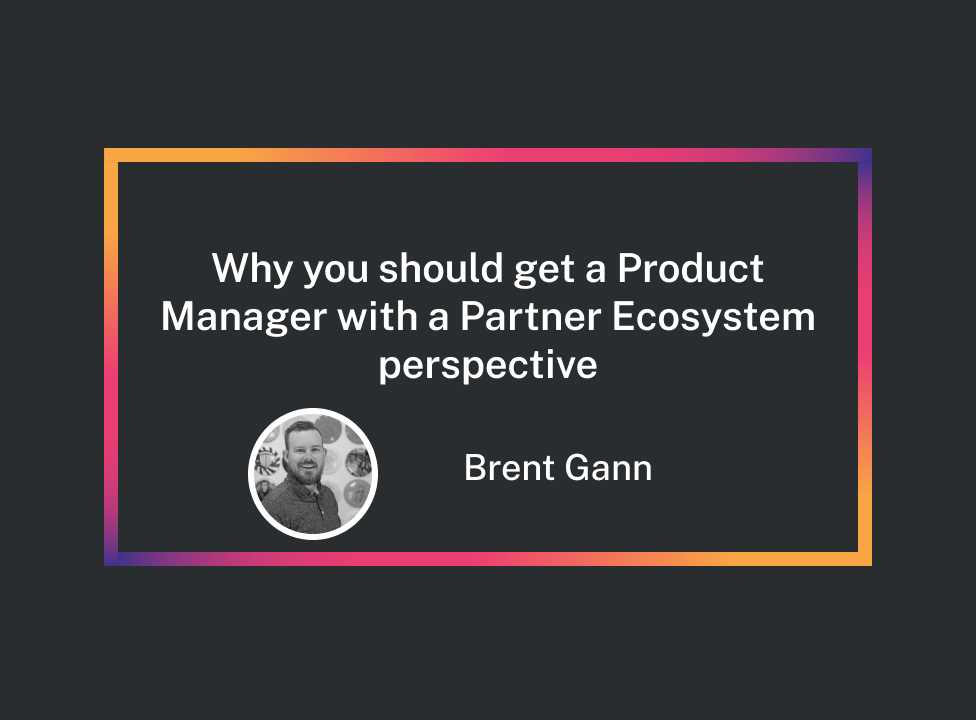Brent Gann lives in Panama City, Florida, and is a Senior Product Manager of Ecosystems at Crossbeam. Like most folks in the industry, Brent got into Partnerships by accident. He was working as a Product Manager at a different company when COVID hit and, as a result, got shuffled into a Partner Manager role. After that experience, he came back to Product Management with a broader perspective and a deep love for partnerships. In this article, Brent digs deep into the Ecosystem Product Manager role and the benefits of having a Partner Ecosystem perspective.

The benefits of a Partner Ecosystem perspective
Ecosystems are a vital growth vector for SaaS moving into the next decade. In the 1990’s we saw the growth of the software developer, then came the web developer, engineers and, finally, in the 2010’s we saw the growth of Product Managers. The 2020’s are going to be the era of partnerships. This next wave is going to see Partner Managers and Ecosystem Product Managers working together to connect new systems, in new ways and provide new value to their customers.
Gone are the days of having software that is a jack of all trades, but a master of none. Customers want products that are “best-in-breed” for each segment. The question is “how do these systems work together?”. The answer, an ecosystem of integrations.
Ecosystems create a new expectation that systems will integrate effectively and share data, automate workflows, and create entirely new value propositions. This means Product Managers will have to not only know their products, but the products in the stack of their customers. Product Managers will have to think beyond the bounds of their product and look for ways to enable other products.
Product Managers who can look at their product through a Partner Ecosystem perspective often find exciting opportunities. These opportunities can include expanding the product footprint, bringing more value to customers, automating existing workflows, creating new processes, and much more. It can also expand the value a product or service brings to an organization. If one person or business group is using your product, that’s great. But when you can expand the value of your product by leveraging data and enabling automation, that expands the overall value of the product to the greater organization.
When do you need an Ecosystem Product Manager
This position should be a part of the growth strategy of a company. If you have five employees, it’s probably premature. Employee count might not be the best metric, but there are a few key business indicators.
The first indicator is when you have a unique dataset that is valuable in other systems. When this occurs, the strategy of how that data is packaged, distributed, consumed, and ultimately leveraged is critical to the usability of a product’s integration. This creates a business need to evaluate Ecosystem Product Management as a dedicated role.
Ecosystems aren’t limited to exporting data though. When you have a unique way to action or display another product’s data, that is a potential indicator that it’s time to evaluate Ecosystem Product Management as well. In much the same way as above, the strategy around data is important, but this time more focused on the ingestion, storage, and actionability of the integration pieces.
Ecosystem product managers can also be important when a product or company serves multiple user personas. The more personas that are using a product results in more potential integrated systems that have to be considered. A company focused on integrating with Salesforce, Hubspot, and Marekto while working with sales, marketing and customer success will need someone that is dedicated to the overall strategy. Even a small number of integrations can be complex when cross cutting these many personas.
When your integration bandwidth is larger than your product bandwidth, that’s the point when you have to invest in Ecosystem Product Management Strategy.
How is this different from a classic Product Manager role?
The generic tasks are very much the same but the people you work with are different. For example, the task of market research. In a classic product manager role, you need to talk to customers and clients. While in an Ecosystem Product Manager you also need to talk to partners, and their customers and clients. The range of people you work with is often very broad.
A traditional product manager works with the customer success, sales and the development team. Since they are not as focused on direct sales, Ecosystem Product Managers work more with partnerships than sales and often with external development partners. Their KPIs are generally more aligned with attributed, influenced, and sourced revenue. The slight shift in focus is often subtle, but is important to have someone with that dedicated ecosystemic view.
Also, if you are working together on integrations, you will often help partner product managers with their work, and they will help with yours. You collaborate to level up and achieve a joint vision, instead of having a more singular view. You spend a lot of time thinking about how to take two things that have very defined value propositions and put them together to create unique and often previously undiscovered value.
A new set of skills
Ecosystem Product Managers definitely benefit from having a technical background, just knowing what’s possible and what’s not. It doesn’t have to be necessarily engineering. It could be data science, analytics, or technical CS manager or operations team member with API and integration experience. This is a growing space, and somebody with a more technical background or a technical partnerships background can utilize the skills they learned during that role. Understanding product integrations as a whole is key, as it can be a very unique space.
There’s also a benefit from understanding the partnerships’ market as opposed to the market the product lives in. For example, I spend a lot of time talking to folks about their markets instead of talking about Crossbeam’s market. There’s a certain business acumen, specific to integrations, that is very valuable in the ecosystem space.
Since ecosystems are potentially a much bigger universe, knowing to prioritize is very important as well. Having the experience to know what is important and having the technical background to know what’s possible will help with generating results here. The great thing is that all of these skills are learnable for product managers interested in moving into an ecosystem focused discipline.
How to hire a Product Manager with a Partner Ecosystem perspective
When looking for someone to fill this role, they should be familiar with the integrations, partnerships and the product spaces. If you find someone that understands at least two of these worlds, they are set up for early success.
A traditional Product Manager’s biggest challenge is likely to be shifting their perspective. You have to take your product and look at it through the lens of a different side of the market. The questions asked in the ideation phase are slightly different. What of our product’s data can be leveraged by others? What data is valuable that our product can expand upon? Are there new personas who would benefit from our product within the products they use every day?
Product management can be a career of empathy, constantly looking at how folks’ daily lives can be improved with a product. An ecosystem product manager also has to have empathy for their customers. This means looking for new creative ways to meet needs that aren’t even known yet.
Recommendations for someone stepping into the role
The step before all steps is to build a great relationship with the person responsible for partnerships at your company. Partner managers are a wealth of knowledge that can’t be understated. They have extensive networks and talk to people from so many segments of your targeted industry that they are a primary internal resource to help. I’ve had the joy of working with some of the best partner people I’ve ever met while doing this role at Crossbeam and it’s enabled me to succeed.
Beyond that, the first thing that you want to do is learn who your Ideal Partner Persona (IPP) is. Certain partners are better targets than others for an integration. As a Product Manager with a Partner Ecosystem perspective, knowing that IPP is imperative to being able to scout possibilities. When scouting, remember that market fit is only part of the equation, and you also want to focus on partners that can support your anticipated partner movements in both size and resources.
The second thing is learning how your company partners. There’s all sorts of categories of partnerships like technology, solution, resellers and others. You’ll want to learn what business engagements look like and how those partner types intersect with your IPP. That becomes the first step of your market research.
The thing I try to remember is that it’s all about perspective extension. I try to look at our Ideal Customer Persona and our Ideal Partner Person’s Customer Persona. The intersection of those two people, jobs, personas, or business groups is often exactly where “X” marks the spot for your integration roadmap.
The home for Partnerships People
Whether you’re looking to step into your first partnership role or increase your performance and move up in your company, the Partnerships Career Progression Playbook has everything you need to be successful in your field.
Join The 1700+ Leaders Transforming Partnerships
As a member of Partnership Leaders you will:
- Build and learn with the top partner people at the best companies around the world.
- Increase your impact and accelerate your career with proven resources, tools, and best practices.
- Grow a network of peers, partners, and advisors with common objectives.


